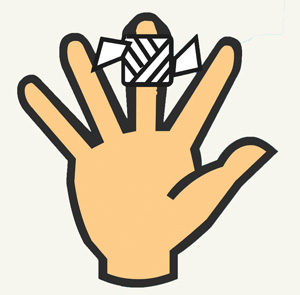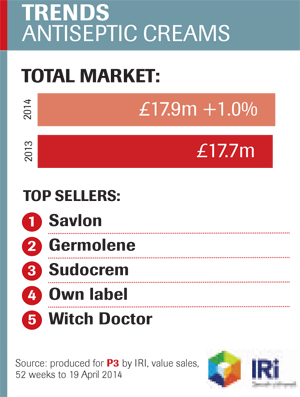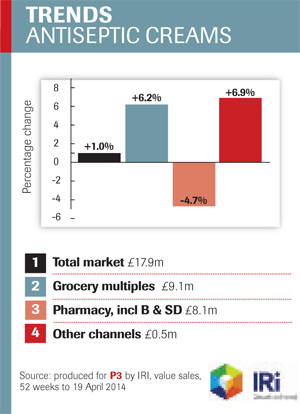Seasonal

First aid matters
In Seasonal
Bookmark
Record learning outcomes
Summer means a rise in accidents and injuries, so it’s time to review the first aid category
It’s promising to be another sporting summer, with the tennis, World Cup and the Commonwealth Games inspiring many to dust off their trainers. With this upsurge in activity comes an increased risk of injuries. Community pharmacy staff are ideally placed to treat and help with first aid and minor sports injuries as well as advise on accident and injury prevention. ‘First aid is easy to learn, easy to remember and easy to do. Pharmacists have the opportunity not only to demonstrate how easy first aid is, but also to advocate for the public to learn more themselves. They could use the contact they have with the public to encourage attendance on first aid courses and for people to look at online learning and first aid phone apps,’ says Paul Stoddart of the British Red Cross.
Accidents will happen
Each year there are 2.7 million accidents that need hospital treatment, of which 477,500  involved children under five. Some 55 per cent of accidental injuries at home involve a fall, with over 65s and under fives most at risk. Some 25,000 under fives attend A&E each year due to accidental poisoning, an area where pharmacists are well placed to advise.
involved children under five. Some 55 per cent of accidental injuries at home involve a fall, with over 65s and under fives most at risk. Some 25,000 under fives attend A&E each year due to accidental poisoning, an area where pharmacists are well placed to advise.
‘Pharmacists are ideally placed to give out general accident prevention information, particularly on the disposal and safe storage of medication. To help prevent children being accidentally poisoned, medication should be stored out of sight and reach of young hands, preferably in a locked cupboard. In 2012/13 more than 3,500 toddlers age one to four were accidentally poisoned by medicines or recreational drugs,’ says Sheila Merrill, public health advisor at the Royal Society for the Prevention of Accidents. ‘Pharmacists can also discuss the importance of medicine reviews with older people. The over 65s are more at risk of a fall if they’re on five or more medications.’
RoSPA ran its first Family Safety week in March and a major theme was to look around your home from a child’s point of view.
First aid advice
It’s important that pharmacy staff keep up to date with first aid training, in particular those  offering a minor ailments service. British Red Cross offers a range of courses, including one aimed at pharmacists which covers administration of adrenaline/epinephrine auto-injectors (www.redcross.org.uk)
offering a minor ailments service. British Red Cross offers a range of courses, including one aimed at pharmacists which covers administration of adrenaline/epinephrine auto-injectors (www.redcross.org.uk)
‘If you have not already attended a first aid course then this would be the best place to start; being able to practise the skills you may need to use in a first aid situation will help you build confidence and allow you to make mistakes in a safe environment. If you’re already trained then our free first aid apps will help you stay up to date with current first aid guidelines,’ says Mr Stoddart. St John Ambulance also offers a range of courses (www.sja.org.uk/sja/training- courses.aspx).
It’s suggested that these are some of the most important first aid areas to brush up on:
Cuts and grazes
- Wash and dry hands; put on sterile gloves
- Clean minor cut/graze under running water or saline solution to remove dirt. Don’t wash a wound that’s bleeding heavily – u’ll wash away the clotting agents
- Pat dry with sterile dressing or clean, lint-free material
- Cover with sterile adhesive dressing
- Don’t remove embedded objects – get medical treatment.
Burns/scalds
- Cool the burn under cold running water for at least 10 minutes.
- Cover burnt skin with cling film or clean plastic bag
- Treat pain with analgesics
- Any burn larger than a postage stamp, or a deep burn, needs medical attention.
Bruises
- Cool area with ice pack wrapped in towel or cold compress
- Arnica cream/gel may help bruising heal faster.
Heavy bleeding
- Use sterile gloves G Apply direct pressure to wound, using a clean absorbent pad
- Elevate limb to slow bleeding
- Bandage pad in place
- Seek medical help.
Minor ailments service
AAH customer Mohammed Ijaz of Cheadle Heath Pharmacy in Stockport, has been running a minor ailments service for 18 months, which includes support for first aid issues.
‘Common problems we deal with include cuts and bruises, athlete’s foot, coughs and colds, headlice, threadworm, thrush and eye infections. Most of these don’t need a GP appointment or an A&E visit and customers save time by coming to us,’ says Mr Ijaz.
The service has about 25 users a month and remedies are supplied from a set formulary. ‘We have lots of customers coming in with cuts and bruises. We can determine whether they need stitches or whether we can treat with plasters or Steristrips.’
Sports injuries
An estimated 22 million sports injuries occur each year. Watch out for an increase in sports injuries as the nation continues to be sport crazy through this summer.
‘Sprains and strains are the most likely injuries pharmacy staff will encounter, along with  bumps and bruises and stiff, aching muscles,’ says Lynn McGinness, senior product manager at Mentholatum. She has these top tips on avoiding sprains and strains:
bumps and bruises and stiff, aching muscles,’ says Lynn McGinness, senior product manager at Mentholatum. She has these top tips on avoiding sprains and strains:
- People who have not played sport or exercised for some time, have health, weight or injury issues should check with their GP first
- A proper warm-up is essential
- Wear the correct shoes for the activity
- Advice from a professional when starting a new sport or regime will make sure exercises and manoeuvres are carried out correctly
- Cool down with stretches at the end of a session
- Treat injuries promptly.
A survey for Barclays Spaces for Sports found that 26 per cent of people who suffered a sprain or strain did nothing to treat their injury, and only six per cent visited their
pharmacy for advice. ‘This means there is a great opportunity for pharmacy to step in to recommend products and strategies to help treat minor problems and advise customers when to seek further help.
‘As the Mentholatum shopper research identified a lack of understanding of the difference between the different types of product and how and when they should be used, it’s a case of education. A well-signposted fixture, with clearly merchandised products will attract customers – and a friendly offer of assistance will help them make the most of this category,’ says Ms McGinness.
For pharmacies keen on expanding this area, it’s worth contacting local sports clubs and sports injury therapists to let them know you have a good range of products and are committed to offering professional advice.
Category update
Deep Relief is being supported this summer with a nationwide radio campaign which targets active women aged 55+. In addition, a print campaign in monthly women’s magazines will reach 3.2 million readers. Deep Freeze is being promoted with a radio campaign on XFM as a sponsor of their ports bulletins on weekdays and weekends.
Nelsons Arnicare Arnica Cooling Gel is being promoted with a new campaign this summer, which aims to recruit new sporting customers by positioning the gel for post-exercise use. The ‘Personal Best’ campaign includes print advertising in women’s magazines, a campaign in sports centres and sampling at sporting events this summer. Further support for the brand is a sponsorship campaign this summer with tennis stars Martina Hingis and the world’s junior number one Belinda Bencic.
Comment
 Lila Thakerar, Shaftesbury Pharmacy, Harrow ‘The first source of advice for minor injuries is a local pharmacy so items used for first aid and sports injuries come in a category that should have a vast range of products. These should include antiseptic creams and sprays, bandages, plasters, slings, analgesics and anti-inflammatories for all ages as well as pain-relief sprays and creams. The demand for these items is not seasonal so should be given a permanent prime position in the pharmacy throughout the year. The brand leaders are Band Aid, Deep Heat and the generic analgesics are the best buys.’
Lila Thakerar, Shaftesbury Pharmacy, Harrow ‘The first source of advice for minor injuries is a local pharmacy so items used for first aid and sports injuries come in a category that should have a vast range of products. These should include antiseptic creams and sprays, bandages, plasters, slings, analgesics and anti-inflammatories for all ages as well as pain-relief sprays and creams. The demand for these items is not seasonal so should be given a permanent prime position in the pharmacy throughout the year. The brand leaders are Band Aid, Deep Heat and the generic analgesics are the best buys.’
 Dilip Patel, Mirage Pharmacy, Handsworth ‘This is a big category for us, especially at this time of year when cuts, grazes and sport-related injuries are more common. We haven’t seen an increase in sales due to the World Cup, but we did notice an increase in sports-related injuries during the Olympics. People may come in asking for bandages, antiseptic creams and creams for sprains and twisted ankles. We do a fair bit in supports for injuries as well. We’ll give customers advice about resting and not to go and play five-a-side football until the injury has been healed. For customers who play sport regularly, I recommend that they do warm-up exercises prior to playing the sport itself. In the summer months, it becomes a more prominent section in the store. Pharmacy can increase over-the-counter sales by stocking a good range of products and having knowledgeable staff and pharmacists available to answer any questions that customers might have.’Â
Dilip Patel, Mirage Pharmacy, Handsworth ‘This is a big category for us, especially at this time of year when cuts, grazes and sport-related injuries are more common. We haven’t seen an increase in sales due to the World Cup, but we did notice an increase in sports-related injuries during the Olympics. People may come in asking for bandages, antiseptic creams and creams for sprains and twisted ankles. We do a fair bit in supports for injuries as well. We’ll give customers advice about resting and not to go and play five-a-side football until the injury has been healed. For customers who play sport regularly, I recommend that they do warm-up exercises prior to playing the sport itself. In the summer months, it becomes a more prominent section in the store. Pharmacy can increase over-the-counter sales by stocking a good range of products and having knowledgeable staff and pharmacists available to answer any questions that customers might have.’Â
 Nemesh Patel, AMG Pharmacy, Braintree ‘Visiting a pharmacy is a vital first step in the provision of advice and managing minor sports injuries. The right early intervention can assist in the healing process and prevent secondary symptoms such as skin irritations and infections. Enhancing staff knowledge on wound management and when to refer patients to a GP will enhance customer confidence in your pharmacy. An opportunity is to develop links with local sports clubs and help them create a first aid box. For example, we could tailor the first aid kit to the most common types of injuries experienced in that particular sport, such as astro turf burns and bruised ankles for hockey players.'
Nemesh Patel, AMG Pharmacy, Braintree ‘Visiting a pharmacy is a vital first step in the provision of advice and managing minor sports injuries. The right early intervention can assist in the healing process and prevent secondary symptoms such as skin irritations and infections. Enhancing staff knowledge on wound management and when to refer patients to a GP will enhance customer confidence in your pharmacy. An opportunity is to develop links with local sports clubs and help them create a first aid box. For example, we could tailor the first aid kit to the most common types of injuries experienced in that particular sport, such as astro turf burns and bruised ankles for hockey players.'
